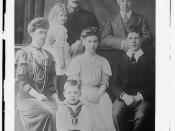Sophocles was one of the most celebrated playwrights of his time, writing more than 100 plays to captivate and delight his ancient Greek audiences. Today, although only seven plays remain, his work continues to be enjoyed, evoking a variety of emotions and passions from his meaningful and disturbing tragedies, proving that he revolutionised the face of drama. One of Sophocles most legendary plays, Oedipus the King, demonstrates his outstanding writing skill, by the number of techniques he incorporates, such as dramatic irony, symbolism and his usage of the Chorus.
Dramatic irony is a prominent device used in many tragedies. It allows the audience to feel a sense of privilege and engagement in the play and develops an alliance between the dramatist and the spectators, so that mere curiosity is not the only aspect keeping the viewers interested. Such tragedies containing dramatic irony include Othello, Romeo and Juliet and Time in the Conways by J.B.
Priestley. In Oedipus the King, everyone in the audience knows from the beginning that Oedipus has killed his father and married his mother, not only from the prologue, but due to the fact that the basic story of Oedipus was a well known myth of the time. The tension of the play, then, builds up from OedipusÃÂ slow but foreseeable advancement towards this horrifying self-knowledge. Watching OedipusÃÂ fate unfold, the audience associates with the protagonist, vividly sharing the horror of the reversal he suffers and recognising the command that fate has. By relating with the audience, Sophocles accomplished the catharsis that Aristotle thought was so essential. One scene in particular illustrates an obvious example of dramatic irony, when Oedipus is addressing his people about the plague they are suffering.
ÃÂAnd while you suffer, none suffers more than I.
You have your several griefs, each...


